- Home
- Stephen Crane
Maggie, a Girl of the Streets and Other New York Writings Page 4
Maggie, a Girl of the Streets and Other New York Writings Read online
Page 4
VI
Pete took note of Maggie.
“Say, Mag, I’m stuck on yer shape. It’s outa sight,” he said, parenthetically, with an affable grin.
As he became aware that she was listening closely, he grew still more eloquent in his descriptions of various happenings in his career. It appeared that he was invincible in fights.
“Why,” he said, referring to a man with whom he had had a misunderstanding, “dat mug scrapped like a damn dago. Dat’s right. He was dead easy. See? He tau’t he was a scrapper! But he foun’ out diff’ent! Hully gee.”
He walked to and fro in the small room, which seemed then to grow even smaller and unfit to hold his dignity, the attribute of a supreme warrior. That swing of the shoulders that had frozen the timid when he was but a lad had increased with his growth and education at the ratio of ten to one. It, combined with the sneer upon his mouth, told mankind that there was nothing in space which could appall him. Maggie marvelled at him and surrounded him with greatness. She vaguely tried to calculate the altitude of the pinnacle from which he must have looked down upon her.
“I met a chump deh odder day way up in deh city,” he said. “I was goin’ teh see a frien’ of mine. When I was a-crossin’ deh street deh chump runned plump inteh me, an’ den he turns aroun’ an’ says, ‘Yer insolen’ ruffin,’ he says, like dat. ‘Oh, gee,’ I says, ‘oh, gee, go teh hell and git off deh eart’,’ I says, like dat. See? ‘Go teh hell an’ git off deh eart’,’ like dat. Den deh blokie he got wild. He says I was a contempt’ble scoun’el, er something like dat, an’ he says I was doom’ teh everlastin’ pe’dition an’ all like dat. ‘Gee,’ I says, ‘gee! Deh hell I am,’ I says. ‘Deh hell I am,’ like dat. An’ den I slugged ’im. See?”
With Jimmie in his company, Pete departed in a sort of blaze of glory from the Johnson home. Maggie, leaning from the window, watched him as he walked down the street.
Here was a formidable man who disdained the strength of a world full of fists. Here was one who had contempt for brass-clothed power; one whose knuckles could defiantly ring against the granite of law. He was a knight.
The two men went from under the glimmering street-lamp and passed into shadows.
Turning, Maggie contemplated the dark, dust-stained walls, and the scant and crude furniture of her home. A clock, in a splintered and battered oblong box of varnished wood, she suddenly regarded as an abomination. She noted that it ticked raspingly. The almost vanished flowers in the carpet-pattern, she conceived to be newly hideous. Some faint attempts she had made with blue ribbon, to freshen the appearance of a dingy curtain, she now saw to be piteous.
She wondered what Pete dined on.
She reflected upon the collar and cuff factory. It began to appear to her mind as a dreary place of endless grinding. Pete’s elegant occupation brought him, no doubt, into contact with people who had money and manners. It was probable that he had a large acquaintance of pretty girls. He must have great sums of money to spend.
To her the earth was composed of hardships and insults. She felt instant admiration for a man who openly defied it. She thought that if the grim angel of death should clutch his heart, Pete would shrug his shoulders and say: “Oh, ev’ryt’ing goes.”
She anticipated that he would come again shortly. She spent some of her week’s pay in the purchase of flowered cretonne for a lambrequin. She made it with infinite care and hung it to the slightly-careening mantel, over the stove, in the kitchen. She studied it with painful anxiety from different points in the room. She wanted it to look well on Sunday night when, perhaps, Jimmie’s friend would come. On Sunday night, however, Pete did not appear.
Afterward the girl looked at it with a sense of humiliation. She was now convinced that Pete was superior to admiration for lambrequins.
A few evenings later Pete entered with fascinating innovations in his apparel. As she had seen him twice and he had different suits on each time, Maggie had a dim impression that his wardrobe was prodigiously extensive.
“Say, Mag,” he said, “put on yer bes’ duds Friday night an’ I’ll take yehs teh deh show. See?”
He spent a few moments in flourishing his clothes and then vanished, without having glanced at the lambrequin.
Over the eternal collars and cuffs in the factory Maggie spent the most of three days in making imaginary sketches of Pete and his daily environment. She imagined some half dozen women in love with him and thought he must lean dangerously toward an indefinite one, whom she pictured with great charms of person, but with an altogether contemptible disposition.
She thought he must live in a blare of pleasure. He had friends, and people who were afraid of him.
She saw the golden glitter of the place where Pete was to take her. An entertainment of many hues and many melodies where she was afraid she might appear small and mouse-colored.
Her mother drank whiskey all Friday morning. With lurid face and tossing hair she cursed and destroyed furniture all Friday afternoon. When Maggie came home at half-past six her mother lay asleep amidst the wreck of chairs and a table. Fragments of various household utensils were scattered about the floor. She had vented some phase of drunken fury upon the lambrequin. It lay in a bedraggled heap in the corner.
“Hah,” she snorted, sitting up suddenly, “where deh hell yeh been? Why deh hell don’ yeh come home earlier? Been loafin’ ’round deh streets. Yer gettin’ teh be a reg’lar devil.”
When Pete arrived Maggie, in a worn black dress, was waiting for him in the midst of a floor strewn with wreckage. The curtain at the window had been pulled by a heavy hand and hung by one tack, dangling to and fro in the draft through the cracks at the sash. The knots of blue ribbons appeared like violated flowers. The fire in the stove had gone out. The displaced lids and open doors showed heaps of sullen grey ashes. The remnants of a meal, ghastly, like dead flesh, lay in a corner. Maggie’s red mother, stretched on the floor, blasphemed and gave her daughter a bad name.
VII
An orchestra of yellow silk women and bald-headed men on an elevated stage near the centre of a great green-hued hall, played a popular waltz. The place was crowded with people grouped about little tables. A battalion of waiters slid among the throng, carrying trays of beer glasses and making change from the inexhaustible vaults of their trousers pockets. Little boys, in the costumes of French chefs, paraded up and down the irregular aisles vending fancy cakes. There was a low rumble of conversation and a subdued clinking of glasses. Clouds of tobacco smoke rolled and wavered high in air about the dull gilt of the chandeliers.
The vast crowd had an air throughout of having just quitted labor. Men with calloused hands and attired in garments that showed the wear of an endless trudge for a living, smoked their pipes contentedly and spent five, ten, or perhaps fifteen cents for beer. There was a mere sprinkling of kid-gloved men who smoked cigars purchased elsewhere. The great body of the crowd was composed of people who showed that all day they strove with their hands. Quiet Germans, with maybe their wives and two or three children, sat listening to the music, with the expressions of happy cows. An occasional party of sailors from a war-ship, their faces pictures of sturdy health, spent the earlier hours of the evening at the small round tables. Very infrequent tipsy men, swollen with the value of their opinions, engaged their companions in earnest and confidential conversation. In the balcony, and here and there below, shone the impassive faces of women. The nationalities of the Bowery beamed upon the stage from all directions.
Pete aggressively walked up a side aisle and took seats with Maggie at a table beneath the balcony.
“Two beehs!”
Leaning back he regarded with eyes of superiority the scene before them. This attitude affected Maggie strongly. A man who could regard such a sight with indifference must be accustomed to very great things.
It was obvious that Pete had been to this place many times before, and was very familiar with it. A knowledge of this fact made Maggie feel little and new.
/> He was extremely gracious and attentive. He displayed the consideration of a cultured gentleman who knew what was due.
“Say, what deh hell? Bring deh lady a big glass! What deh hell use is dat pony?”
“Don’t be fresh, now,” said the waiter, with some warmth, as he departed.
“Ah, git off deh eart’,” said Pete, after the other’s retreating form.
Maggie perceived that Pete brought forth all his elegance and all his knowledge of high-class customs for her benefit. Her heart warmed as she reflected upon his condescension.
The orchestra of yellow silk women and bald-headed men gave vent to a few bars of anticipatory music and a girl, in a pink dress with short skirts, galloped upon the stage. She smiled upon the throng as if in acknowledgment of a warm welcome, and began to walk to and fro, making profuse gesticulations and singing, in brazen soprano tones, a song, the words of which were inaudible. When she broke into the swift rattling measures of a chorus some half tipsy men near the stage joined in the rollicking refrain and glasses were pounded rhythmically upon the tables. People leaned forward to watch her and to try to catch the words of the song. When she vanished there were long rollings of applause.
Obedient to more anticipatory bars, she reappeared amidst the half-suppressed cheering of the tipsy men. The orchestra plunged into dance music and the laces of the dancer fluttered and flew in the glare of gas jets. She divulged the fact that she was attired in some half dozen skirts. It was patent that any one of them would have proved adequate for the purpose for which skirts are intended. An occasional man bent forward, intent upon the pink stockings. Maggie wondered at the splendor of the costume and lost herself in calculations of the cost of the silks and laces.
The dancer’s smile of stereotyped enthusiasm was turned for ten minutes upon the faces of her audience. In the finale she fell into some of those grotesque attitudes which were at the time popular among the dancers in the theatres up-town, giving to the Bowery public the phantasies of the aristocratic theatre-going public, at reduced rates.
“Say, Pete,” said Maggie, leaning forward, “dis is great.”
“Sure,” said Pete, with proper complacence.
A ventriloquist followed the dancer. He held two fantastic dolls on his knees. He made them sing mournful ditties and say funny things about geography and Ireland.
“Do dose little men talk?” asked Maggie.
“Naw,” said Pete, “it’s some damn fake. See?”
Two girls, on the bills as sisters, came forth and sang a duet that is heard occasionally at concerts given under church auspices. They supplemented it with a dance which of course can never be seen at concerts given under church auspices.
After the duettists had retired, a woman of debatable age sang a negro melody. The chorus necessitated some grotesque waddlings supposed to be an imitation of a plantation darkey, under the influence, probably, of music and the moon. The audience was just enthusiastic enough over it to have her return and sing a sorrowful lay, whose lines told of a mother’s love and a sweetheart who waited and a young man who was lost at sea under the most harrowing circumstances. From the faces of a score or so in the crowd, the self-contained look faded. Many heads were bent forward with eagerness and sympathy. As the last distressing sentiment of the piece was brought forth, it was greeted by that kind of applause which rings as sincere.
As a final effort, the singer rendered some verses which described a vision of Britain being annihilated by America, and Ireland bursting her bonds. A carefully prepared crisis was reached in the last line of the last verse, where the singer threw out her arms and cried, “The star-spangled banner.” Instantly a great cheer swelled from the throats of the assemblage of the masses. There was a heavy rumble of booted feet thumping the floor. Eyes gleamed with sudden fire, and calloused hands waved frantically in the air.
After a few moments’ rest, the orchestra played crashingly, and a small fat man burst out upon the stage. He began to roar a song and stamp back and forth before the foot-lights, wildly waving a glossy silk hat and throwing leers, or smiles, broadcast. He made his face into fantastic grimaces until he looked like a pictured devil on a Japanese kite. The crowd laughed gleefully. His short, fat legs were never still a moment. He shouted and roared and bobbed his shock of red wig until the audience broke out in excited applause.
Pete did not pay much attention to the progress of events upon the stage. He was drinking beer and watching Maggie.
Her cheeks were blushing with excitement and her eyes were glistening. She drew deep breaths of pleasure. No thoughts of the atmosphere of the collar and cuff factory came to her.
When the orchestra crashed finally, they jostled their way to the sidewalk with the crowd. Pete took Maggie’s arm and pushed a way for her, offering to fight with a man or two.
They reached Maggie’s home at a late hour and stood for a moment in front of the gruesome doorway.
“Say, Mag,” said Pete, “give us a kiss for takin’ yeh teh deh show, will yer?”
Maggie laughed, as if startled, and drew away from him.
“Naw, Pete,” she said, “dat wasn’t in it.”
“Ah, what deh hell?” urged Pete.
The girl retreated nervously.
“Ah, what deh hell?” repeated he.
Maggie darted into the hall, and up the stairs. She turned and smiled at him, then disappeared.
Pete walked slowly down the street. He had something of an astonished expression upon his features. He paused under a lamppost and breathed a low breath of surprise.
“Gawd,” he said, “I wonner if I’ve been played fer a duffer.”
VIII
As thoughts of Pete came to Maggie’s mind, she began to have an intense dislike for all of her dresses.
“What deh hell ails yeh? What makes yeh be allus fixin’ and fussin’? Good Gawd,” her mother would frequently roar at her.
She began to note, with more interest, the well-dressed women she met on the avenues. She envied elegance and soft palms. She craved those adornments of person which she saw every day on the street, conceiving them to be allies of vast importance to women.
Studying faces, she thought many of the women and girls she chanced to meet, smiled with serenity as though forever cherished and watched over by those they loved.
The air in the collar and cuff establishment strangled her. She knew she was gradually and surely shrivelling in the hot, stuffy room. The begrimed windows rattled incessantly from the passing of elevated trains. The place was filled with a whirl of noises and odors.
She wondered as she regarded some of the grizzled women in the room, mere mechanical contrivances sewing seams and grinding out, with heads bended over their work, tales of imagined or real girlhood happiness, past drunks, the baby at home, and unpaid wages. She speculated how long her youth would endure. She began to see the bloom upon her cheeks as valuable.
She imagined herself, in an exasperating future, as a scrawny woman with an eternal grievance. Too, she thought Pete to be a very fastidious person concerning the appearance of women.
She felt she would love to see somebody entangle their fingers in the oily beard of the fat foreigner who owned the establishment. He was a detestable creature. He wore white socks with low shoes.
He sat all day delivering orations, in the depths of a cushioned chair. His pocketbook deprived them of the power of retort.
“What een hell do you sink I pie fife dolla a week for? Play? No, py damn!”
Maggie was anxious for a friend to whom she could talk about Pete. She would have liked to discuss his admirable mannerisms with a reliable mutual friend. At home, she found her mother often drunk and always raving.
It seems that the world had treated this woman very badly, and she took a deep revenge upon such portions of it as came within her reach. She broke furniture as if she were at last getting her rights. She swelled with virtuous indignation as she carried the lighter articles of household use, one by one u
nder the shadows of the three gilt balls, where Hebrews chained them with chains of interest.
Jimmie came when he was obliged to by circumstances over which he had no control. His well-trained legs brought him staggering home and put him to bed some nights when he would rather have gone elsewhere.
Swaggering Pete loomed like a golden sun to Maggie. He took her to a dime museum where rows of meek freaks astonished her. She contemplated their deformities with awe and thought them a sort of chosen tribe.
Pete, raking his brains for amusement, discovered the Central Park Menagerie and the Museum of Arts. Sunday afternoons would sometimes find them at these places. Pete did not appear to be particularly interested in what he saw. He stood around looking heavy, while Maggie giggled in glee.
Once at the Menagerie he went into a trance of admiration before the spectacle of a very small monkey threatening to thrash a cageful because one of them had pulled his tail and he had not wheeled about quickly enough to discover who did it. Ever after Pete knew that monkey by sight and winked at him, trying to induce him to fight with other and larger monkeys.
At the Museum, Maggie said, “Dis is outa sight.”
“Oh hell,” said Pete, “wait till next summer an’ I’ll take yehs to a picnic.”
While the girl wandered in the vaulted rooms, Pete occupied himself in returning stony stare for stony stare, the appalling scrutiny of the watch-dogs of the treasures. Occasionally he would remark in loud tones: “Dat jay has got glass eyes,” and sentences of the sort. When he tired of this amusement he would go to the mummies and moralize over them.
Usually he submitted with silent dignity to all which he had to go through, but, at times, he was goaded into comment.
“What deh hell,” he demanded once. “Look at all dese little jugs! Hundred jugs in a row! Ten rows in a case an’ ’bout a t’ousand cases! What deh blazes use is dem?”

 The Complete Short Stories and Sketches of Stephen Crane
The Complete Short Stories and Sketches of Stephen Crane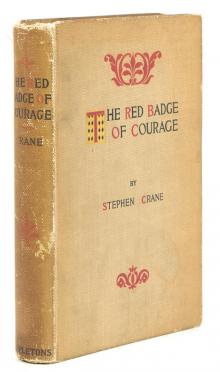 The Red Badge of Courage: An Episode of the American Civil War
The Red Badge of Courage: An Episode of the American Civil War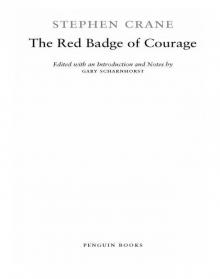 The Red Badge of Courage
The Red Badge of Courage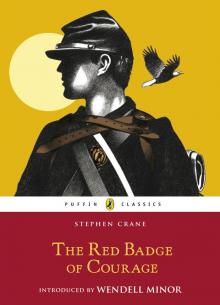 The Red Badge of Courage by Stephen Crane
The Red Badge of Courage by Stephen Crane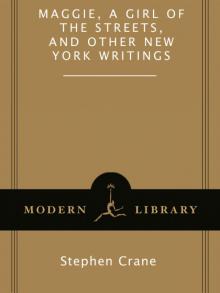 Maggie, a Girl of the Streets and Other New York Writings
Maggie, a Girl of the Streets and Other New York Writings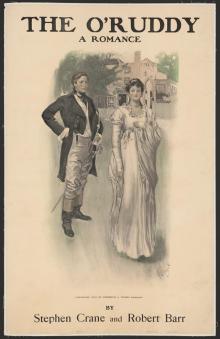 The O'Ruddy: A Romance
The O'Ruddy: A Romance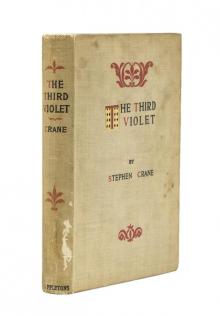 The Third Violet
The Third Violet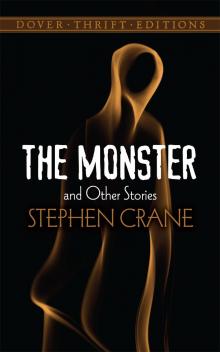 The Monster and Other Stories
The Monster and Other Stories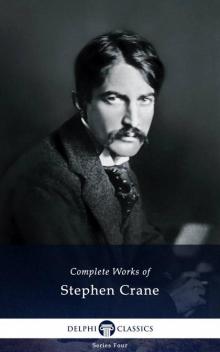 Complete Works of Stephen Crane
Complete Works of Stephen Crane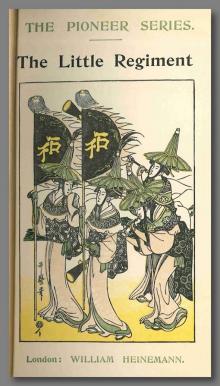 The Little Regiment, and Other Episodes of the American Civil War
The Little Regiment, and Other Episodes of the American Civil War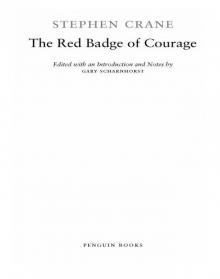 The Red Badge of Courage and Other Stories
The Red Badge of Courage and Other Stories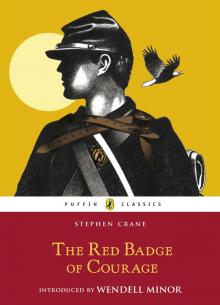 Red Badge of Courage (Puffin Classics Relaunch)
Red Badge of Courage (Puffin Classics Relaunch) The Fight: Whilomville Stories: XI.
The Fight: Whilomville Stories: XI. A Man and Some Others.
A Man and Some Others. The Monster
The Monster